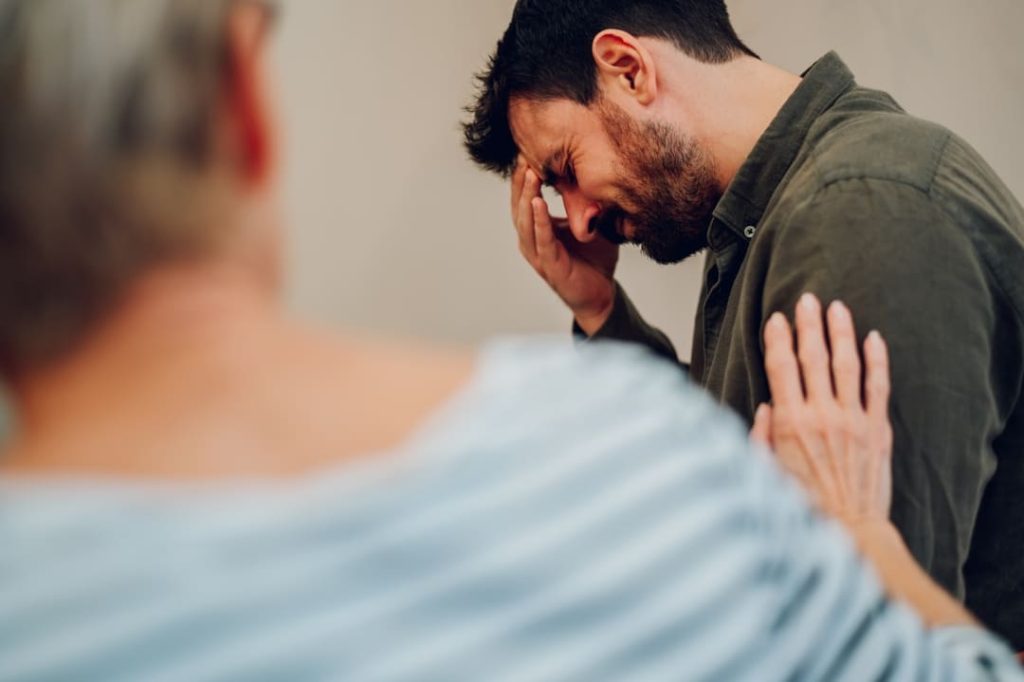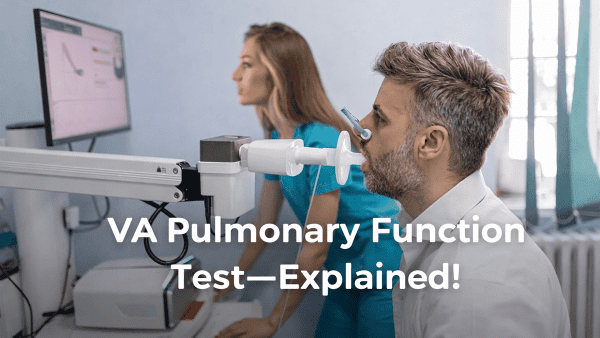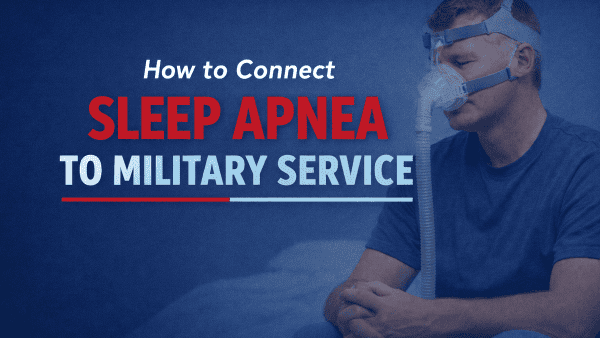Looking for Expert-Level VA Claim Answers?📱Call Us Now! 737-295-2226
In this post, we’ll look at six helpful combat-related PTSD and mental health resources.
We’ll also look at the effects of combat trauma and how you could qualify for PTSD VA benefits. Let’s get started.
Table of Contents

6 Combat-Related PTSD and Mental Health Resources
In addition to VA disability compensation for combat-related mental health conditions, the VA provides many mental health resources. Six of these valuable resources include:
Veterans Crisis Line, 988, (Option #1)
Also available 24/7, this confidential hotline puts veterans and service members who are in crisis in touch with qualified, caring responders.
Real Warriors (866) 966-1020
Another 24/7 resource, this service, is available through the Defense Centers of Excellence for Psychological Health and Traumatic Brain Injury. Representatives are trained to help connect those with TBIs, PTSD, and other psychological health issues with the best resources.
National Call Center for Homeless Veterans, (877) 424-3838 (Option #1)
This 24/7 resource is available to veterans who are homeless or at risk of becoming homeless. Callers will be assisted by trained VA counselors who can connect homeless vets (or their family members) with housing and health care/mental health care resources.
War Vet Call Center, (877) 927-8387
If you need a listening ear to discuss your military experience or your transition from the military to civilian life, this center can put you in touch with veterans from several different eras.
Women Veterans Call Center, (855) 829-6636
This hotline ((855) VA-Women) is for female veterans and their families. Call representatives are uniquely suited to understand and help with issues specific to women in the military.
K9s for Warriors, (904) 686-1956
This organization helps match a service dog for veterans with PTSD at no cost, delivering maximum benefits with minimum administrative costs. PTSD veterans and dogs form a companionship while lifting the veteran’s mood and providing a renewed enjoyment in life.

Effects of Combat Trauma
Most of us sensed nothing would be the same after September 11, 2001. This was especially true for military members and their families.
The 9/11 terrorist attack would kick off the Global War on Terror, which would pull 1.9 to 3 million U.S. service members into operations in Iraq and Afghanistan. More than half of these service members would deploy more than once.
These soldiers would join millions of living veterans from former conflicts, including the Bosnia and Herzegovina intervention, Granada, the US invasion of Panama, the Vietnam War, Gulf War Veterans, Korean War Veterans, and the list goes on.
If you’re one of the millions of veterans in the US, you may put on a tough face from day to day, but chances are, you bear mental health wounds from combat trauma that few people see. War has a way of leaving more than just physical scars.
Post-combat mental health conditions commonly include:
Combat-Related PTSD
Post-traumatic Stress Disorder (PTSD) is defined as a psychiatric disorder affecting people who have experienced or seen a traumatic event (or series of events) that is emotionally or physically harmful or life-threatening.
Symptoms of PTSD may include:
- Flashbacks
- Recurring memories or dreams
- Avoidance (of places or objects that remind you of the traumatic experience)
- Being constantly on-guard
- Being easily startled
- Angry outbursts
- Risky, reckless behavior
- Blaming self or others
- Loss of interest in things that once interested you
- Feelings of shame
Depression
Symptoms may include:
- Feeling empty
- Feeling hopeless
- Feeling worthless
- Anger or irritability
- Feeling guilty or ashamed
- Loss of interest in hobbies or previously enjoyable activities
- Low energy
- Trouble concentrating
- Trouble sleeping or staying awake
- Weight loss or gain
- Thoughts of death or suicide
Other Effects of Combat Trauma
Elevated Suicide Rates
The latest report from the VA on suicide prevention showed that in 2020, veteran suicides outpaced the non-veteran adult suicide rate by more than 57%. In that same year, it was the second leading cause of death among veterans younger than age 45.
Substance Use Disorders (SUDs)
Veterans with mental illness frequently turn to substance abuse to dull their emotional pain. Among Afghanistan and Iraq veterans, 63% of those diagnosed with SUDs also met the criteria for post-traumatic stress disorder (PTSD).
Relationship Difficulties
Deployments can take a heavy toll on relationships. A lot can happen during a deployment that can change you, your loved ones, and how you interact. Bridging those gaps can be challenging. And if you are bringing mental health problems home from the combat zone, this could put even more strain on a relationship. A Rand study showed that accumulated months of deployment significantly heightened risks for divorce among military members.

You’re Not Alone.
If you suffer from combat-induced mental health disorders—know that you are not alone. Research shows a high incidence of mental health disorders among veterans. For example, at least 14% to 16% of US service members who were deployed to Iraq and Afghanistan have suffered from PTSD or depression.
So why does military service, particularly combat-related service, induce mental health problems? Here are some key factors:
- Seeing others harmed. Whether fellow soldiers or the enemy, witnessing injuries or killing can kick off PTSD, depression, and other mental disorders.
- Fear of harm to self. A constant fear of imminent danger can also trigger these disorders.
- Having to harm others. As one soldier put it, “I held two seemingly contradictory beliefs: Killing is always wrong, but in war, it is necessary. How could something be both immoral and necessary?” Even when you harm others out of defense, it can be tremendously disorienting morally and lead to depression and/or anxiety.
- Lack of a clearly defined objective. Good vs. evil can be easier on the psyche than nebulous wars with unclear goals, enemies, and divided support on the homefront.
- Lack of sleep. A state of hypervigilance, limited or irregular sleep opportunities, and uncomfortable sleeping conditions are all part of deployment. Research shows that sleep deficiency can trigger mental health problems or exacerbate existing ones.
- Lack of a support network. Deployments pull you away from your usual support circle. They can also put stress on typically supportive relationships. For example, you may feel distant from a spouse due to divergent activities and less frequent communication. Resentment can also build up between the soldier and the spouse at home who bears the homefront’s burdens.
- Repeated tours of duty. Any deployment can be challenging for someone, exposing them to more danger, injury, and violence, upending their sleep schedule, and derailing their usual support network. Because the Global War on Terror played out over such an extended period, it was common for troops to be deployed over and over again, increasing risks for mental health disorders.
- Traumatic brain injury. Studies show that anywhere between 10 and 20% of deployed service members have sustained concussions (a form of traumatic brain injury). Many of these are due to blast-related injuries incurred in Iraq and Afghanistan. Even before deployments, soldiers are at a higher risk for concussions due to military training, including hand-to-hand combat training and heavy weapon and munitions training. Concussions, and especially repeated concussions, have been associated with depression, anxiety, PTSD, and personality changes.
- Reintegration stress. While being apart from loved ones can be difficult, so can returning home to them. When families are forced to cope without a military member, it can be hard to make space for them when they return. The veteran may feel like they have been through something that no one understands and have trouble functioning as a civilian when their military experiences so heavily mark them.
- Physical injuries. War wounds can cause feelings of loss. Veterans often grieve the physical specimens they once were and the activities they could perform. They may experience feelings of inferiority and uselessness when they can’t contribute like before. Their injuries may steal their autonomy and leave them feeling like a burden to others.
Pre-Combat Trauma
Although this article is about combat-induced mental illness, it’s worth noting that just being a military member can lead to higher mental illness rates. This can be due to the ever-present challenges of achieving certain ranks and promotions, top-down leadership that can shut down opportunities to negotiate a better work environment, frequent moves and deployments, and sexual assault. (One study showed that 32% of female veterans and nearly 5% of male veterans screened positive for military sexual trauma.)
If you have experienced any of these stresses before going into combat, you could be layering new trauma on top of old trauma and heightening your risks for mental health challenges.
How Do I Qualify for PTSD VA Disability?
See Also: Top 3 Ways to Get a VA Rating for PTSD
Financial help in the form of VA disability payments is available for qualifying vets with service-connected mental health disorders. To file for VA benefits help, start by getting a mental health diagnosis. You may seek this diagnosis from a private doctor or a VA health provider. This should include documentation of the severity of your symptoms.
Next, you will need “medical nexus” documentation from a doctor. This is documentation linking your mental health disorder to your military service or to another service-connected disability. (An example of the latter would be that your chronic pain from your combat injuries is causing you to become depressed.) Your doctor may use wording such as, “It is at least as likely as not that [patient’s] mental health condition is connected to their military service.”
You can also write a personal statement and/or collect buddy letters, which are written by friends, relatives, co-workers, etc., who can document evidence of your mental health condition.
For example, a spouse might write a letter describing how you have become increasingly agitated and angry since returning from combat. Another example of a buddy letter would be a friend documenting how certain noises and locations trigger violent behaviors in a way that they never did before your combat experience.
Remember that to file a successful PTSD VA claim, you will need to connect your PTSD to a “stressor.” A stressor is a traumatic event through which you were personally or indirectly exposed to actual or threatened death, serious injury, or sexual violence. Receiving certain medals and citations automatically concedes the stressor event. Read more about which medals/citations apply in Chapter 3 of this article.
Remember that some mental health conditions may not manifest until months or even years after you have returned from combat. Or, they may manifest mildly after you return but get worse with time. If you were given a VA rating for your depression, anxiety, PTSD, etc., but believe it is too low, you may be eligible for up to 100 percent VA disability benefits.
See also: How to Prove You Have Combat PTSD
Combat-Related Special Compensation (CRSC)
Some veterans may qualify for combat-related special compensation (CRSC). CRSC provides tax-free payments to retired veterans with combat-related disabilities.
See also: What is Combat-Related Special Compensation (CRSC)?
Deserve a Higher VA Rating?
Book a no-obligation VA Claim Discovery Call with an experienced team member. We’ll review your situation, spot what the VA may have missed, and help you map out a strategy to unlock the VA disability rating and tax-free compensation you’ve earned for your service. Click the red button below to book your call.



